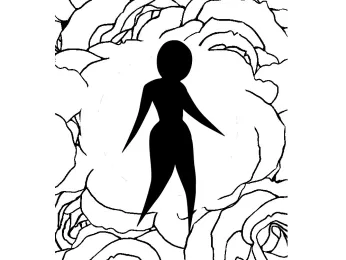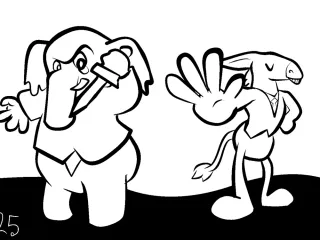
October 28, 2025
Transmissions: The wrong body
Gwendolyn Ann Smith READ TIME: 4 MIN.
It feels somehow apropos to discuss this topic so close to the spooky season. Indeed, by its very topic, I feel I should be holding a flashlight under my chin, as if it's some sort of ghost story being recited around a campfire.
It is not, however, any such thing.
I was recently part of a discussion on transgender rights. I suppose this isn't that unusual.
One of the participants, a well-meaning ally, was showing his support for transgender youth, adding that, "they deserve a break after being born in the wrong body."
I didn't address that in the moment. After all, I am more than willing to have allies – even imperfect ones – and I personally feel that this one likely has their heart in the right place. And I know what they were referring to, even if the language feels like it came off the cover of a 1950s pulp novel.
Indeed, I know I have heard this explanation for being trans from my own childhood days which, I dare to admit, are closer to “Scooby-Doo” than “Skibidi Toilet.”
Now, sure, it's an easy explanation for what it's like as a transgender person. We tend to go through our lives with a sense of wrongness around our gender. We simply do not feel like what everyone has told us we are, and that sense of wrongness can gnaw at our soul.
It can grow so strong that, even in an era like today – where transgender people are being vilified, criminalized, and erased – we still opt to weather all this in the gender we experience, not the one we were assigned by a doctor at the moment of birth.
Maybe this is closer to a spooky story than I thought.
The thing is, however, that even though my trans body is now as perfectly feminine as I wish – though it is closer now than it was in decades past – this is still very much my body. There is an electro-chemical soup contained within a wad of meat, floating around in a cranium that is very much mine. These hands I type with, the eyes I peer at the screen with, these are all very much the collection of atoms that have opted to be me for a few decades.
That, itself, is not wrong.
Sure, there are a lot of theories about what makes someone trans. For example, the likelihood that this is a quirk of our births, caused by our bodies deciding to zig into one common gender, while our brain's chemistry zags the other way. It makes sense to me, but like much of science, remains largely unproved.
We do know that humans, when we are still developing, begin with identical structures that end up differentiating themselves at around six weeks. The labioscrotal swelling forms into labia or scrotum, the genital tubercle develops into a penis or a vagina, and so on.
Meanwhile, a "hormonal flush" of the developing brain – or lack thereof – could potentially "sex"' the brain differently than the primary sexual characteristics.
There have been a number of studies over the years that have attempted to pin this down. One in 2018 from the European Society of Endocrinology found that the brains of transgender people are more like their desired gender even in early childhood. Likewise, a 2022 study shows that the "Brain Sex" of transgender women is closer to their gender identity than that they were assigned at birth.
These are much the same as earlier studies showing differences in trans brains versus their non-trans counterparts.
Moreover, the introduction of hormone replacement therapy and other treatments make for additional changes to the body. A study published on October 20 in the journal “Nature Medicine” shows that after six months of HRT, the blood plasma of trans women falls in line with our non-transgender counterparts.
All of this should indicate that those changes that happened to everyone's body while it developed remain, to a point, mutable. Much like how trans women can produce viable breast milk from breasts developed not from silicone implants, but our own body tissue.
So now, I might argue, this body may not be wholly right, but it's not wrong. Yet, as I mentioned above, we still very much experience what can be best termed as "wrongness."
I would also add, as an aside, that even with so many studies, one should also listen to transgender people themselves. Hear our stories. Our experiences, while not identical, are nevertheless universal. Accepting transgender people, providing care to transgender people, and allowing us to exist vastly improves our lives. This doesn't require much to comprehend.
We exist in a time of firmly dichotomic social genders, where we are expected to be firmly one or the other of just two genders. This is growing daily, as the federal government does all it can to legislate and police trans bodies.
The government is not alone, as mainstream media attempts to fit people into the same dichotomy, impressing it upon us all from an early age, and pushing trans people – particularly transgender youth – to suffer through a puberty they don't want, and one that could safely and easily be temporarily arrested.
We live in a time when we have the understanding and the ability to make transgender lives better, and to make our bodies largely align with our spirits. At the same time, we live in a society so fearful, and so poisoned by anti-transgender attitudes, that actions that should fall between patient and doctor are politicized.
That is what's truly wrong around here.
Gwen Smith shouldn't need a study to prove she exists. You'll find her at www.gwensmith.com



